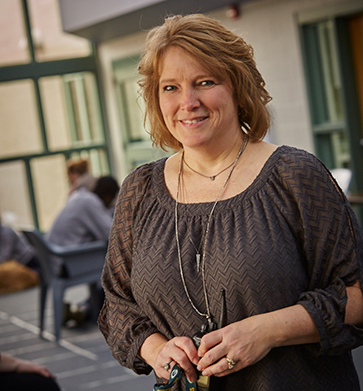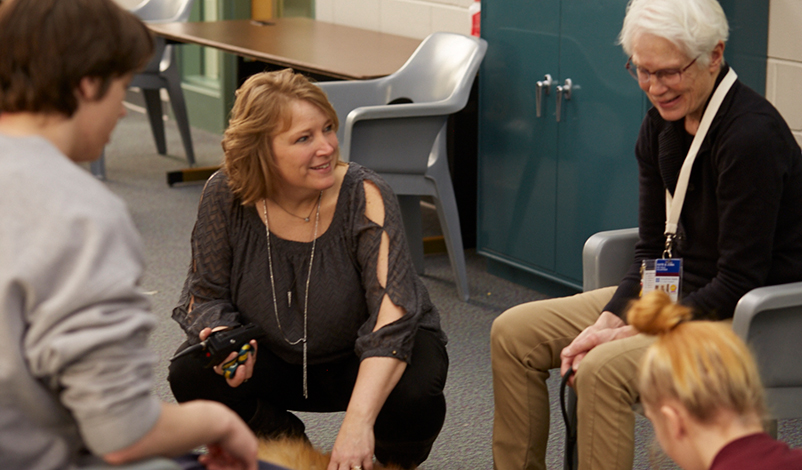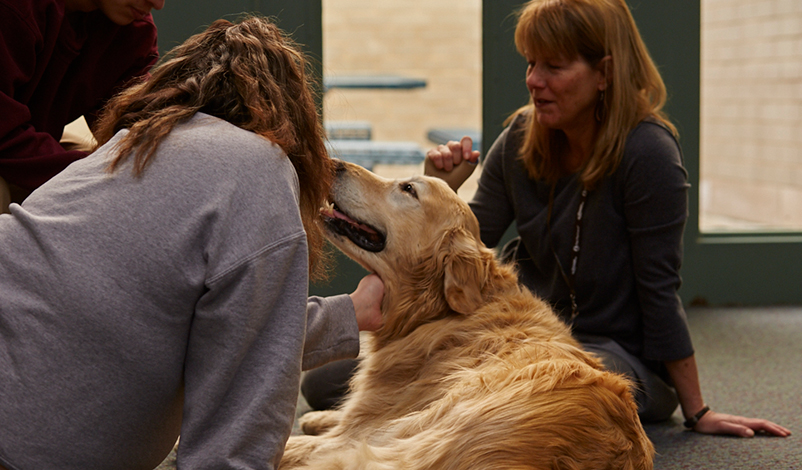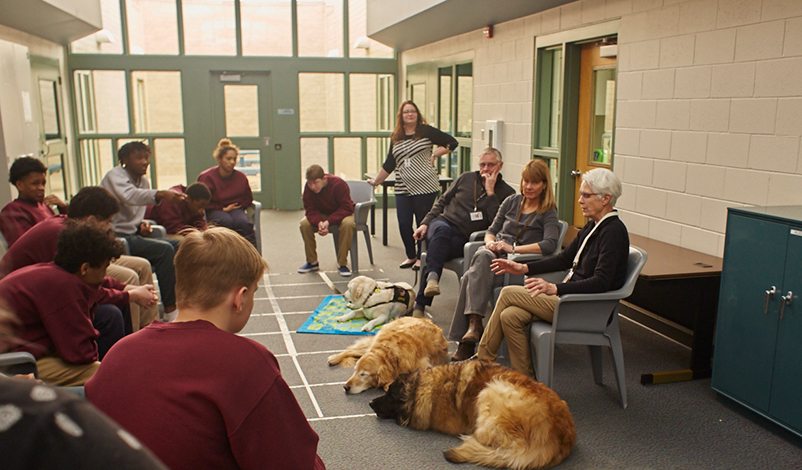The diversion programs, which attempt to divert youth from detention placements, serve roughly 155 youth a day within the community. As director, Schott oversees a variety of staff, including a manager, four shift supervisors, 13 youth counselors, eight youth workers, eight intervention counselors, six trackers, two cooks, a nurse, a medical director, a case manager, and a receptionist.
The Linn County facility, one of nine in Iowa, is considered one of Iowa’s best because it is the only one that requires staff to have a four-year degree and one year’s experience working with high-risk youth prior to employment. In addition, Schott and her staff are always looking for ways to enhance programming, staying as fresh and engaging as possible.
Bernie Broghammer Bordignon ’80, a juvenile court officer and detention center board member, has watched Schott’s success as she goes above and beyond by implementing innovative programming.
“Dawn has the foresight to take that extra step and provide hands-on activities that help reduce anxiety, anger, and stress, while also presenting long-term coping and living skills,” she says.
“Dawn has the foresight to take that extra step and provide hands-on activities that help reduce anxiety, anger, and stress, while also presenting long-term coping and living skills.”
Progressive programming garners results
Schott says her proudest accomplishments are helping develop the efficient and effective detention programming concepts that lean toward skill building rather than treatment. Initiatives include a mobile crisis unit for suicidal youth, a trauma-informed yoga program to help youth deal with emotions and the physical side effects of those emotions, and a new garden project.
“It is incredible how many kids have never been part of planting, nurturing, and harvesting garden crops,” says Schott, who grew up and currently lives on an Iowa farm. She loves to plant and take care of flower gardens—her favorite being the labor-intensive, six-foot-tall red cannas whose bulbs have to be planted each spring and removed every fall.
Schott makes a point of coming to see how the youth’s garden is progressing and complimenting the kids on their hard work.
“One resident came up with the idea to cut some flowers and create centerpieces for the dining room tables,” she says. “Although they were in plastic cups, they added some hominess to a very sterile environment, and, boy, was she proud of her idea. I tell you what, allowing kids to have a success goes a long way!”
Emily Blomme, the executive director at Foundation 2, an organization providing crisis mental health services, and detention center board member, says watching Schott’s diligence to transform the center and positively impact youth is remarkable.
“When youth have an opportunity to tend to something, they learn how to turn that positivity into how they treat themselves and others,” Blomme says. “Dawn’s calm, reasonable, and collaborative approach to solving complex issues is incredible.”
When the teachers initiated the idea of therapy dogs, Schott, who trained and showed dogs in obedience and showmanship in 4-H, instantly gave it her support and stamp of approval.
When youth have an opportunity to tend to something, they learn how to turn that positivity into how they treat themselves and others.
The success of the program was best seen when a young man, who was uninterested in interacting with the dogs, sat off to the side of the class. One of the dogs with a kind sense walked over and sat in front of the boy and put her head on his knee.
“The next thing I knew, the boy was hugging the dog and sobbing. Talk about having an impact!”
“I know how nonjudgmental a dog can be,” says Schott, who owns a Rottweiler named Riggs. “That is what kids need—someone who loves them unconditionally.”
The next thing I knew, the boy was hugging the dog and sobbing. Talk about having an impact!
In another situation, a young woman went to court and had an explosive experience. She had to be restrained by numerous officers on the way back to detention. She kicked out the car window and nearly jumped from the moving vehicle traveling at 75 mph on the interstate. When the judge in her case learned of her interest in the dogs, he requested a therapy dog attend her next court hearing.
“Fortunately, a trainer was willing to do this and that girl’s court experience was totally different the next time. She was able to focus while she constantly touched that dog sitting next to her," said Schott.
“Fortunately, a trainer was willing to do this and that girl’s court experience was totally different the next time. She was able to focus while she constantly touched that dog sitting next to her.”
CPR program in the works
After hearing on the news about an infant who stopped breathing but was saved by a neighbor who knew CPR, Schott says the newest program she plans to implement is the chance to teach kids CPR.
“CPR is taught in schools, but many of the kids we work with miss the lesson,” she says. “I don’t want any person to feel the way that young mom did about her baby, so we are having two staff certified to teach CPR and then give all youth the opportunity to be CPR certified.”
 Advancing your work by advancing your degree
Advancing your work by advancing your degree
Schott admits going back for her master’s degree in criminal justice at MMU really opened her eyes as to how easy it is to become stagnant in your profession.
“It was exciting to read research on trends and get affirmation that our programs are promoting the most effective methods and theories of juvenile justice,” she says.
Because of her positive experience, she’s encouraged three of her staff, Dan Williams ’94, ’18 MACJ, Janelle Scott ’18 MACJ, and Rod Rasmussen ’20 MACJ, to advance their education at Mount Mercy, too.
“All too often we get stuck in our ways," said Schott. "Going back to school helps you identify other concepts and awaken the sleepy in your everyday work.”
All too often we get stuck in our ways. Going back to school helps you identify other concepts and awaken the sleepy in your everyday work.
Schott is currently an adjunct instructor at MMU. She says she wanted to teach at the college level because she felt that juvenile justice doesn’t get the dedicated class time it needs.
“Dealing with kids is very different from working with adults,” she says, “and the recruiting opportunities are also a bonus.”
Success stories
In 2016, there were 2,936 detention admissions in Iowa, and roughly 65 percent of those were returning youth. Linn County accounted for 354 of the admissions.
“Detention is not treatment, and I worry whether we are meeting the needs of the youth we are housing, especially when mental health needs are seemingly at an all-time high,” Schott says.
“Detention is not treatment, and I worry whether we are meeting the needs of the youth we are housing, especially when mental health needs are seemingly at an all-time high."
Because detention is not treatment, and the average length of stay is just two weeks, success stories are not your typical stories. Occasionally, staff will hear from a youth that has turned their life around but, more often than not, they just don’t know what happens to the kids, which can be hard and disheartening.
“I did see an ex-resident several years ago as a guest speaker in church,” Schott says. “He had joined the army and was speaking about how his tour in Afghanistan had changed him. His dad reported that his stay in detention was the beginning of his behavior change, and he was grateful to the staff for their kindness and support during that challenging time in their lives.”
Schott ran into another resident in a hospital elevator who was there with her mom who was dying from cancer.
“She is now happily married with three kids and has successfully moved on with life in a positive way,” Schott says. “She is a CNA and loves her job. She spoke with such gratitude for the staff at detention and for me as a role model.”
Schott says she believes in opportunities and being open minded to new ways of functioning. “I want these kids to have an abundance of tools in their tool belt of life,” she says.


